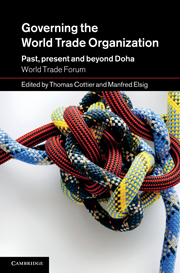Book contents
- Frontmatter
- Contents
- List of figures
- List of tables
- Notes on Contributors
- Preface
- List of abbreviations
- 1 Introduction
- PART I Setting the stage
- PART II Boundaries
- PART III Emerging and established powers
- PART IV Weaker actors
- PART V The consensus principle
- 10 The WTO as a ‘living instrument’: the contribution of consensus decision-making and informality to institutional norms and practices
- 11 Crisis situations and consensus seeking: adaptive decision-making in the FAO and applying its lessons to the reform of the WTO
- PART VI Quo vadis?
- Index
- References
11 - Crisis situations and consensus seeking: adaptive decision-making in the FAO and applying its lessons to the reform of the WTO
Published online by Cambridge University Press: 07 September 2011
- Frontmatter
- Contents
- List of figures
- List of tables
- Notes on Contributors
- Preface
- List of abbreviations
- 1 Introduction
- PART I Setting the stage
- PART II Boundaries
- PART III Emerging and established powers
- PART IV Weaker actors
- PART V The consensus principle
- 10 The WTO as a ‘living instrument’: the contribution of consensus decision-making and informality to institutional norms and practices
- 11 Crisis situations and consensus seeking: adaptive decision-making in the FAO and applying its lessons to the reform of the WTO
- PART VI Quo vadis?
- Index
- References
Summary
Introduction
In an edited volume investigating decision-making in the World Trade Organization, a chapter including a case study on the United Nations' Food and Agriculture Organization (FAO) may at first glance appear out of place. What can be learnt by an organisation that is one of the most important in the global institutional order, from one that is on the periphery? While the WTO's remit spans global trade management and political bargaining over current and future gains from trade, the FAO has traditionally been regarded as a functional agency as foreseen by David Mitrany (1943), concerned with technical cooperation and the dissemination of expertise to reduce hunger worldwide (Pedersen 2006). The only clear tie that binds them together is the Codex Alimentarius Commission, jointly founded by the FAO and World Health Organization (WHO) as an international food standards agency and used to provide guidance to the WTO when judging the legality of restricting the trade of foodstuffs on the grounds of food safety. However, if one looks beyond the policy domains of the two and focuses instead on the political pressures exerted on universal membership international organisations, there is a considerable amount that can be learnt from the FAO in recent years. This chapter looks at two areas: firstly, innovations made to decision-making processes that facilitate the taking of decisions by consensus, and secondly the role of crisis in galvanising member state support for such innovative processes.
- Type
- Chapter
- Information
- Governing the World Trade OrganizationPast, Present and Beyond Doha, pp. 241 - 262Publisher: Cambridge University PressPrint publication year: 2011

